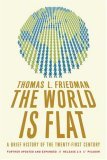The world is already different as we know it. And with US facing a potential recession in 2008, we start to wonder what the future will be like. We can’t possibly predict accurately what will or what won’t happen in the future. But we sure can see what has been happening all this while and why America will eventually step down as the economic centre of the world and why China and India will eventually replace America as the world’s largest and richest nations.
Two books which I had read will definately make you change the way you think and view about the world.
1. Thomas L. Friedman – The World is Flat

These are some rules promoted in the book by the author Thomas L. Friedman
Rule #1: When the world goes flat, and you are feeling flattened, reach for a shovel and dig inside yourself. Don’t try to build walls.
Rule #2: And the small shall act big. One way small companies flourish in the flat world is by learning to act really big. And the key to being small and acting big is being quick to take advantage of all the new tools for collaboration to reach farther, faster, wider, and deeper.
Rule #3: And the big shall act small. One way that big companies learn to flourish in the flat world is by learning how to act really small by enabling their customers to act really big.
Rule #4: The best companies are the best collaborators. In the flat world, more and more business will be done through collaborations within and between companies, for a very simple reason: The next layers of value creation, whether in technology, marketing, biomedicine, or manufacturing are becoming so complex that no single firm or department is going to be able to master them alone.
Rule #5: In a flat world, the best companies stay healthy by getting regular chest X-rays and then selling the results to their clients.
Rule #6: The best companies outsource to win, not to shrink. They outsource to innovate faster and more cheaply in order to grow larger, gain market share and hire more and different specialists, not to save money by firing more people.
Rule #7: Outsourcing isn’t just for Benedict Arnolds. It’s also for idealists.
2. Timothy Ferriss – The 4-Hour Workweek

This book talks about how you can be more productive and why the author challenge readers that a 40 hour workweek is really not necessary and long hours doesn’t necessarily means more productivity. One of my favorite quote that I have found from this book is:
“Are you being productive or just trying to act active?”
It reminds me of times when I was merely acting to be active, not being productive, and where those unproductive time could be spent on communicating with others, having a rest, or maybe even wandering around as that will inspire more creativity then sitting 12 hours/day in front of the desk.
Coincidentally, these 2 books actually talked about the importance of outsourcing and how outsourcing had actually helped in increasing personal productivity, personal and corporate goals. I have read stories, reports and discussions from the media and forums where there are Americans who had lost their jobs due to the fact that companies in America has outsource their jobs to countries such as China, India, Russia, Malaysia etc. It happened, still happening and will probably keep on happening.
As the author from The World is Flat, Thomas L. Friedman, pointed out in his book:
When I was growing up, my parents used to say to me: “Finish your dinner, people in China are starving.” I, by contrast, find myself wanting to say to my daughters: “Finish your homework, people in China and India are starving for your job”
China and India are growing as we all know that, and it’s getting more and more important that you add value and reinvest in yourself and assets then to wait for your job or role to be outsourced to these countries.
Leave a Reply